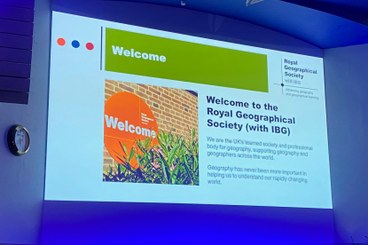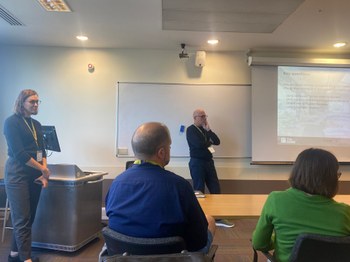A double session organized with TheGame researchers at the Royal Geographical Society-Institute of British Geographers Annual Conference, London, UK

Date:
Event location: London, UK

Noemi Bergesio, Joanna Jordan, and Claudio Minca co-organized a double session titled “2-0: Counter-geographies of the Balkan Route” at the Royal Geographical Society (with the Institute of British Geographers) Annual International Conference, in London, from 29 August to 1 September, 2023. Many of TheGAME team of researchers presented research in the session.
The aim of the session was to draw together different perspectives, approaches, empirical studies, on what is considered the most important overland informal migration corridor in Europe. The different papers and research presented during the sessions contributed to delineate the Route as an archipelago of counter-geographies, made of a multiplicity of formal and informal sites and camps, and of multifarious practices, also giving an overall idea of the evolution of the route, outlining a path in constant change and adaptation.
The heterogeneity of disciplinary approaches, methodologies and theories mobilized in the works presented, together with the lively and insightful discussion at the end of the sessions, reflect both the complexity of the Balkan Route as well as the need and urgency to understand more deeply that constellation of practices and narratives that take form along it.
The works presented span from the role of the hotspot as a dispositif (Lorenzo Vianelli, University of Bologna), the biopolitics of camp closures (Yolanda Weima and Claudio Minca, University of Bologna), the institutional refugee geographies of the Route in Northern Serbia (Dragan Umek, University of Trieste, and Claudio Minca), the roles of IOM/ICMPD/FRONTEX in building legitimacy for and implementing a transnational border policing apparatus in the Balkans (Manja Petrovska, University of Amsterdam), the effects of informal mobility of migrants in Bosnia-Herzegovina (Roberta Gentili, University of Bologna), the makeshift camps and other infrastructures of mobility (Joanna Jordan, University of Bologna), the role of visual activism in defining assembling mobilities in Bosnia-Herzegovina (Benedetta Zocchi, University of Oxford), and a genealogy of the Route through the perspective of migrants’ passages from the Balkans to France (Martina Tazzioli, University of Bologna). Finally, Valeria Raimondi (University of Bologna) acted as discussant for both sessions.
Three other presenters were due to take part in the discussion but were unable to reach London due to technical problems related to air traffic. Specifically, their research concerns the repositioning of epistemologies of the Balkan Route(s) (Elisa Satjukow, Leipzig University, and Germany Philipp Schäfer, University of Osnabrück), the children’s vanishing geographies on the Balkan route and the ethnography of departure (Lucija Klun, Slovenian Migration Institute), and the vernacular geographies of the border, drawing from the case of Piazza della Libertà in Trieste (Noemi Bergesio, University of Bologna).
The conference was attended by over 2000 geographers from around the world, and is one of the most important annual gatherings for geographers in Europe.